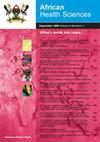Evaluation of socio-demographic profile and basic risk factors of tuberculosis patients in South 24 Parganas district of West Bengal, India: a hospital-based study
IF 0.9
4区 医学
Q3 MEDICINE, GENERAL & INTERNAL
引用次数: 0
Abstract
Aim: To study and analyse the socio-demographic profile and basic risk factors of tuberculosis(TB) patients and their relationwith the current epidemiological status of TB registered under the RNTEP program in the study area. Subjects and Methods: This prospective study was conducted on 1743 newly registered tuberculosis patients at TB-DOT centerof South 24 Parganas, West Bengal, India from 2011-2014. Socio-demographic variables and baseline characteristics of theparticipants were noted by a semi-structured questionnaire. Results: Our study results indicate that more than 95% of the TB patients were from lower socioeconomic class, and hadpoor literacy status and tuberculosis was observed highest in non-agricultural labour and cultivators. Among the young adult’smajority of the affected population were females from the lower/upper-lower socioeconomic class. Our analysis revealed that,in successful tuberculosis therapy, men were more defaulters than women. Conclusion: Our study provides a socioeconomic profile and the risk factors of tuberculosis in patients such as the status oftherapeutic intervention, involvement of other chronic diseases, age, sex and malnutrition. The findings of this study can beused to plan future studies with specific risk factors of the region and also for implementing the intervention and evaluating itseffectiveness.Keywords: Mycobacterium tuberculosis; socio-demographic factors; multi-drug resistance; pulmonary tuberculosis; extra-pulmonarytuberculosis.印度西孟加拉邦南24帕尔加纳斯区结核病患者的社会人口特征和基本危险因素评估:一项基于医院的研究
目的:研究分析研究区RNTEP项目登记结核病患者的社会人口学特征、基本危险因素及其与结核病流行病学现状的关系。对象与方法:本前瞻性研究对2011-2014年在印度西孟加拉邦南24 Parganas结核病- dot中心新登记的1743例结核病患者进行了研究。通过半结构化问卷记录了参与者的社会人口变量和基线特征。
结果:95%以上的结核病患者来自社会经济较低阶层,文化水平较低,非农业劳动力和耕耘者结核病发病率最高。在年轻人中,大多数受影响的人群是来自较低/上层社会经济阶层的女性。我们的分析显示,在成功的结核病治疗中,男性的违约率高于女性。结论:我们的研究提供了结核病患者的社会经济概况和危险因素,如治疗干预状况、其他慢性疾病的参与、年龄、性别和营养不良。本研究的结果可用于规划该地区特定风险因素的未来研究,也可用于实施干预和评估其有效性。关键词:结核分枝杆菌;socio-demographic因素;耐多药;肺结核;extra-pulmonarytuberculosis。
本文章由计算机程序翻译,如有差异,请以英文原文为准。
求助全文
约1分钟内获得全文
求助全文
来源期刊

African Health Sciences
MEDICINE, GENERAL & INTERNAL-
CiteScore
2.30
自引率
0.00%
发文量
179
审稿时长
>12 weeks
期刊介绍:
The African Health Sciences is an internationally refereed journal publishing original articles on research, clinical practice, public health, policy, planning, implementation and evaluation, in the health and related sciences relevant to Africa and the tropics. Its objectives are to: Advocate for and promote the growth of reading culture in sub Saharan Africa; Provide a high quality journal in which health and policy and other researchers and practitioners in the region can and world wide, can publish their work; Promote relevant health system research and publication in the region including alternative means of health care financing, the burden of and solution of health problems in marginalized urban and rural communities amongst the displaced and others affected by conflict; Promote research and the systematic collection and collation and publication of data on diseases and conditions of equity and influence; Promote development of evidence-based policies and guidelines for clinical, public health and other practitioners. African Health Sciences acknowledges support provided by the African Health Journals Partnership Project that is funded by the US National Institutes of Health (through the National Library of Medicine and the Fogarty International Center) and facilitated by the Council of Science Editors.
 求助内容:
求助内容: 应助结果提醒方式:
应助结果提醒方式:


